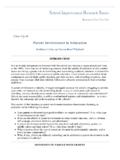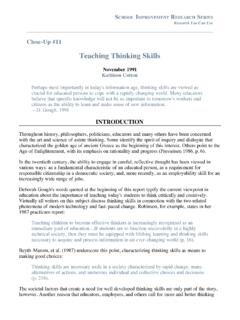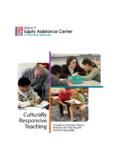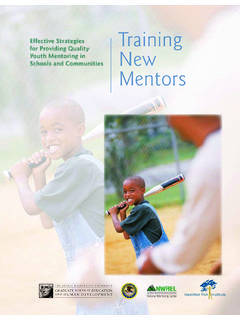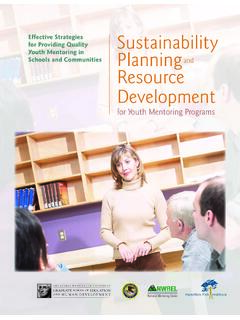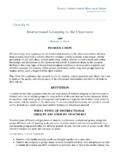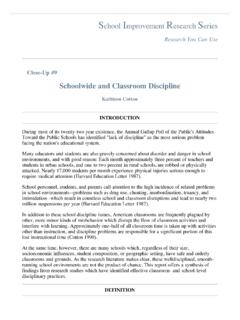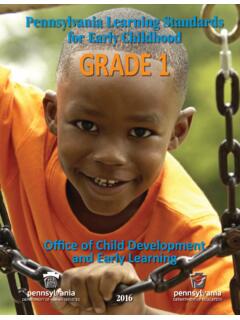Transcription of Research on Early Childhood Education
1 School Improvement Research Series(SIRS) Research You Can UseTopical Synthesis #3 Research on Early Childhood EducationKathleen Cotton and Nancy Faires ConklinINTRODUCTIONE ducation in the second half of the twentieth century has been characterized by increases in theprovision of educational programs for preschool-age children. The largest wave of preschooleducation activity has been the federally funded Head Start program, established in the 1960s tohelp children overcome the cognitive, social, emotional, and physical deficits that frequentlyaccompany growing up in economically deprived homes. By providing an array of educationaland social services to children and their families, Head Start programs are designed to fostergeneral well-being and enhance school readiness, so that these children might gain the fullbenefit of their school experiences and be more successful in life Head Start and other programs for economically disadvantaged children can be shown tomake a positive difference in these children's school and life experiences, their impact can bevery widespread.
2 Schweinhart (1985) points out that one-fourth of all children under the age ofsix are living in poverty, and that three-fifths of the mothers of three- and four-year-oldchildren now work outside the home. However, fewer than 20 percent of the nation's threeandfour-year-olds from poor families are currently enrolled in Head Start enrollment has also increased dramatically in recent years. While only sevenstates mandate kindergarten attendance, about 95 percent of all children currently attendkindergarten (Sava 1987), and 23 percent of these attend full-day programs (Karweit 1988).In addition to the generally recognized need to provide some kind of extra support to childrenfrom low-income homes, there is another reason for the dramatic increase in educationalprograms for children before first grade.
3 This is the increase, alluded to above, of mothers in theworkforce. Many parents who are not at home with their children in the daytime are notsatisfied with unstructured day care or babysitting, preferring that their children participate inmore formal learning , some of the increased interest in and push for structured preschool programs comesfrom the unfortunate notion, held by some, that Education is a race to be won, and those whostart first are more likely to finish ahead. Commenting on this source of pressure for preschooleducation, Elkind (1988) says:..the choice of the phrase "Head Start" was unfortunate. "Head Start" does imply a race. Andnot surprisingly, when middle income parents heard that low-income children were being givena "Head Start," they wanted a similar "Head Start" for their children.
4 (p. 23)A great many educators and researchers view Early Childhood Education as beneficial tochildren's cognitive and social development. These proponents-- including virtually all of theresearchers and theorists whose work was consulted in order to prepare this document--basetheir conviction on personal observation and on the many Research studies linking earlychildhood programs to desirable outcomes. These outcomes will be described in detail in a latersection of this is important to note, however, that some educators, such as Elkind (1988), Katz (1987),Zigler (1986), and representatives of the National Association for the Education of YoungChildren (1986) warn against too much formal, highly structured Education for very youngchildren.
5 These and other writers have called attention to three major objections to school-basedprograms. As summarized by Katz, these objections include:Such programs, because they are to be conducted in schools normally serving elementary-age children, will inevitably adopt formal academic teaching methods that Early childhoodspecialists generally consider developmentally inappropriate for reporting positive long-term benefits of Early Education programs is based onthe kind of high quality of staff and program implementation unlikely to be duplicated inmost school the special risks of public school programs for young black children,suggesting that such children need comprehensive programs that include health, nutrition,social services, and parent involvement.
6 As well as informal curriculum/methods. ( )In addition, writers such as Herman (1984) and Puleo (1988) call attention to the issuessurrounding the half-day/full-day kindergarten controversy. They note that some educators andresearchers feel that the additional hours are too fatiguing for young children and that, in anycase, increasing allocated time does not necessarily enhance program this array of assertions and reservations about preschool and kindergarten programs, it isimportant to examine what well-designed Research studies reveal about the long- and short-termeffects of Early Childhood is also important to determine whether different effects are produced by different models forearly Childhood programs--to determine, for example, whether didactic, teacher-directedprograms or less-structured.
7 "discovery" models produce superior cognitive and behavioraloutcomes. Finally, we need to determine whether different populations of students responddifferently to Early Childhood Education in general or to particular program EFFECTIVE SCHOOLING RESEARCHThe relationship of the Early Childhood Education Research to the general effective schoolingresearch is also of interest to teachers, administrators, theorists, and researchers. The effectiveschooling Research base developed over the past two decades tells us a great deal about whatschool and classroom practices are effective for students in series of topical synthesis documents of which this report is a part examines particulartopic areas against the backdrop of the general effective schooling Research to determine pointsof congruence and identify any areas where the general and specific bodies of Research do achieve this, the present report invokes the general effective schooling Research cited inEffective Schooling Practices: A Research Synthesis (Northwest Regional EducationalLaboratory 1984).
8 In reviewing the many Research findings cited in this document, it isimportant to remember that they did not, for the most part, emerge from studies conducted withchildren younger that first graders. Many of these studies are therefore not applicable to thesevery young children, because the settings and treatments employed in them represent what Katzdescribed above as "formal academic teaching methods that Early Childhood specialistsgenerally consider developmentally inappropriate for under-six-year-olds." (1987, p. 2)There are, nevertheless, several points of congruence between the two literatures, and these willbe noted following a discussion of the Research on Early Childhood Early Childhood Education RESEARCHWe are concerned here with Research conducted with children three, four, and five years old--the ages which are the focus of most preschool and kindergarten programs.
9 Thus, programs andtreatments conducted with infants and toddlers are excluded from the analysis, as are thosecustodial care arrangements not intended to promote children's general development or fosterfamiliarity with academic activities. In addition, we need to point out that the focus here is thegeneral Early Childhood Education Research ; we have not conducted a detailed analysis of theresearch on special programs for handicapped Research documents were reviewed in preparation for this report. Eighteen werestudies, eight were reviews, and two reported the results of both a study and a review reported the results of Research conducted with preschool children, six concernedresearch with kindergarteners, two reported on Research with both groups, and three had to dowith Research with these plus either younger or older children.
10 Many of the studies had alongitudinal design, and the majority of the studies and reviews were concerned witheconomically disadvantaged, urban, largely black half the studies and reviews looked at the effects of preschool or kindergarten in generalon the cognitive and affective development of participants. The rest were concerned withspecific components within the context of preschool or kindergarten, such as the effects ofparent involvement in Early Childhood programs and the differential effects of curriculummodels. Many outcome areas were examined, particularly the effects of Early childhoodprograms on IQ, achievement, incidence of grade retentions, and incidence of referrals forremedial or special EFFECTS OF PRESCHOOLThe Early studies and evaluations of Head Start programs produced a finding that educators andresearchers of the 1960s and 1970s found disheartening: that while impressive cognitive gainsresult from preschool participation, these gains level off and, in most cases, completely "washout" by the end of second grade.

